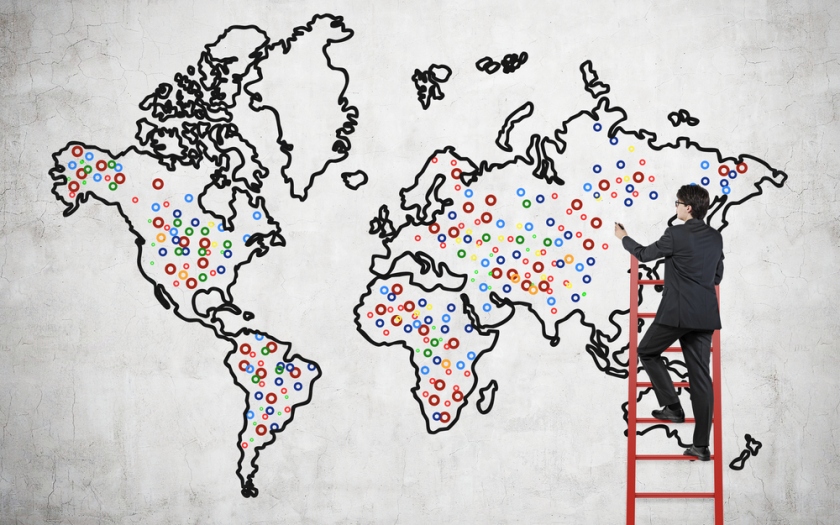Expanding into overseas markets opens up a wealth of opportunities for companies of all sizes. With advancements of digital technologies, the commercial climate may be more competitive but it also opens channels to audiences which would ordinarily not be accessible.
Going global is a significant undertaking but is not beyond the realms of small and expanding businesses. The process may be complex and time-consuming, but translating relevant business documents sets the foundations for you to grow.
In order to communicate effectively and build relationships with your audience, it is essential to break down the language barriers. That probably means you need a professional transcreation agency, which specialises in translating business and mattering materials.
As a business however, especially from the SME sector, in order to save time and money, you should know exactly what is absolutely necessary to translate and what isn’t.
Website
In many instances, your website will be the starting point for customers. If you are targeting a foreign audience, your website is arguably the most important source material to translate.
According to Common Sense Advisory, the majority of the global population have a “can’t read, won’t buy” mentality.
A study preformed in 2014, found that 75% of consumers prefer to purchase merchandise from websites that are written in their native language. Not only that, but 60% never buy from English-only websites.
Translating your website provides a better online service and builds trust and credibility between your brand and the target audience. Ultimately, by addressing customers in their own language they have a better understanding of what you are selling, and the benefits your products and services offer.
Furthermore, your translation has to be persuasive and compelling. That requires using the language correctly and understanding the culture of the audience you are targeting. The personality, voice and style of your page content needs to have the same high-quality as the original English pages.
Localising a website so that is sells you products and services requires the hand of a professional translator. But not just any linguist; a native translator who understands your mindset and behaviour of the target audience together with the concepts of marketing that work in the region.
Simply translating the original page from English into another language is not sufficient. At best, the emotion, passion and persuasion is missing. Most of the time, a direct translation reads like nonsense to native speakers.
Furthermore, translating your website into a foreign language will increase traffic. Most people conduct searches in their native language thus search engines recognise specific keywords.
SEO guru, Neil Patel claims to have increased web traffic to his business site by 47% after translating content into 82 languages. The reason for that is because his website ranks in search engines for multiple languages. If his website was in English, it would not appear in the search results of over a hundred other countries.
Brochure and catalogues
Providing your audience with marketing material that is accessible to all members of the community demonstrates you are a brand that cares about its customers. Furthermore, you increase your chances of reaching a wider audience; not everyone speaks English, even in countries where many of the population is considered fluent.
Translating brochures, catalogues and flyers is an investment that helps to nurture confidence in your brand. Using localisaition services helps you to develop trust and loyalty whilst avoiding misunderstandings.
By helping customers understand your products and your business, you eliminate confusion. If confusion arises, you may lose customers from the outset, or invite problems further down the line because of a misunderstanding.
Frustrated customers are more demanding on your time, and negative experiences reflect badly on your business. Companies expanding into foreign markets cannot afford to lose revenue because of a bad reputation. In short, translating marketing materials saves time whilst boosting productivity and sales.
In-house material for staff
Misunderstandings are a common problem when language barriers are present. The same is true if you have poorly translated documents which are subsequently misinterpreted. When communicating any aspect of your business, including internally, translations need to be accurate, clear and concise.
Translating in-house materials such as company policies, employee contracts, training materials, operational procedures and handbooks that comply with local requirements ensures your staff know what to do and are committed to the goals of your business. Without this, you lose your competitive edge.
When employees do not understand what they are supposed to do, they will feel confused and restless. Furthermore, they will make mistakes which impacts on productivity and could even have a knock-on effect with customers that are potentially mis-sold a product because of a lack of understanding in-house.
Patents and trademarks
Patents, trademarks and other legal documents can present complex problems which could prove very costly. If you intend to market a product in a foreign market, it is wise to protect your intellectual property by filing a patent or registering a trademark in the country you are targeting.
When submitting legal documents to foreign adminstrations, they should naturally be written in the target language. This not only ensures that your intellectual property is filed correctly, but that it is also understood by rival businesses in the region.
Civil servants that perform administrative tasks in government offices are not typically well educated. Many of them will not speak a second language, and if they do it will only be at a basic level.
Patents require a detailed description of the idea or product. The wording of a patent certificate, therefore, is often complex. It is not advisable to run the original text through Google Translate or other machine translation tool. What should be an important legal document is more likely to read gibberish.
Legal language uses specific terminology which is almost a specialist language in its own right. When translating legal documents for the UK system, it is advisable to use a professional language translation agency in UK that specialises in such translations.
If the quality of a patent translation is poor, there is a greater chance the scope of your intellectual property will be overlooked. It is possible, therefore, that rival businesses will be given the same privileges, and should you attempt to challenge the patent in the overseas jurisdiction, the court would rule in favour of the opposition because your patent does not explicably state your idea accurately.
Translators are highly-educated and often have specialist subjects they are also trained in as well as a second language. There are certain professions that require specialist knowledge in order to source an accurately translated document. Law is a prime example.
Failing to effectively protect your intellectual property in any language or jurisdiction presents your business rivals with an opportunity to adopt your ideas, thus weakens your competitive edge. Investing in specialist translation services avoids potential complications later on.
Privacy policy
Data protection is a hot topic right now. The European Union’s General Data Protection Regulations (GDPR) which became official legislation in May 2018 changed the fabric of privacy policy and the information businesses are required to provide customers.
Although the GDPR is specifically designed to protect internet users in Europe, the legislation is far-reaching and affects businesses all over the world. If you collect consumer data from an EU citizen you are subject to GDPR.
Websites and apps are rarely restricted in terms of language. As English is universally accepted as the standard business language, it does not mean that every visitor to your website speaks the language well enough to understand the terms of your privacy policy.
Under GDPR, everyone has a right to know why you are collecting personal data, how you will store it and how you intend to use it. In order to comply with EU legislation, it is advisable to build privacy policies into the design of your website and translate the terms in the target language.
Consumers are much more savvy these days, and following a string of high-profile cases where corporate entities have abused data protection privileges, there is more focus on data protection in the public mindset.
Now that consumers have more rights, and an understanding of the directives brands are legally obliged to fulfil, it is not worth taking the risk of ignoring GDPR. The financial penalties against businesses that are not GDPR compliant are extremely steep – €20m or 4% of your global earnings – whichever is the greater.
That being said, professionally designed privacy policies give customers more confidence in your brand, and thus increases trust. A translated privacy policy not only complies with EU laws but also provides reassurance to end-users that visit your website.
A recent study conducted by a dentist in London clearly shows that their patients prefer to have procedures and dental treatments explained to them in their native language.
Contracts/legal documents
If you are entering in a business contract with a foreign company for whatever reason, two contracts should be drafted; one in English and the other in the native language of your partners or business acquisition.
Failing to make the terms and conditions of a business agreement fully understandable to both parties, could have serious consequences in the event of a dispute. Translated business contract describe responsibilities, timeframes, payments and essentially protect your business interests.
It is important that both sets of contracts are accurate and consistent. Poorly translated agreements can be misinterpreted; and if you are the foreign party, the contract in country the agreement is due to take place will have precedence.
Clarity in communication is a vital ingredient in the recipe of business success. Firms that want to make an impression in foreign markets need to speak the language of your audience; whether they are customers, employees, partners or third party administrators.




